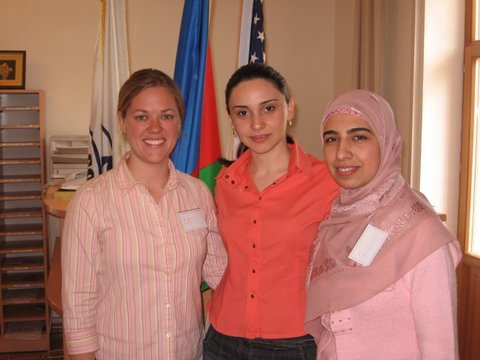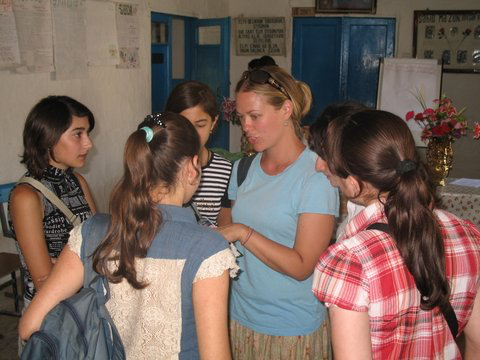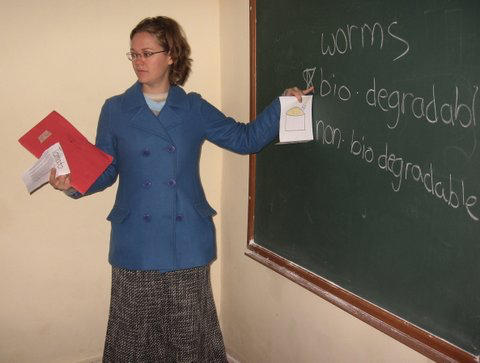
When Erin Gockel, BSN, RN, accepted a Peace Corps assignment to Azerbaijan in 2006, she had no idea she had just taken her first steps down the path to becoming a nurse practitioner.
A 2005 University of California-Davis graduate with a bachelor's degree in history and religious studies, Gockel instead decided to follow her life's passion for working with underserved populations and journey to the small former Soviet republic now sandwiched between Russia and Iran.
It was there while teaching English as a foreign language as her primary Peace Corps project that she got the full, eye-opening impact of what someone with even a little expertise can have in an area almost destitute of medical attention.
"As my secondary project, the Peace Corps said I could do whatever I wanted as long as it met the needs of the community," Gockel said. "One of the major things I did was health education, particularly for women. Azerbaijan is primarily a Muslim country, and they have some strict rules regarding what women can do.
"One of those is they can't use the Internet, and they don't get health education in school so even as a history and religious studies major, I was hugely knowledgeable to them on health care."
It was this realization that first brought Gockel to the UAB School of Nursing where she earned her Bachelor of Science in Nursing in 2012 and led her to again choose the School, in particular the Graduate Nursing Education Primary Care Scholars (GNEPCS) program, for her graduate degree work. The GNEPCS focuses on educating more advanced practice nurses to work in underserved areas and reach more Alabamians needing primary care.
"I went to undergrad here, and I know there are a lot of neat opportunities for students," Gockel said. "It's easy for students to get involved in different things if they have the time. Another reason I wanted to do this program is because that's where my focus has always been - the underserved."

In Azerbaijan, she initially tried to do formal health education classes, but admits they failed miserably because of the country's social mores. Still, when word got out that the self-described "crazy foreigner" was willing to share what she knew about health care, the women of the small village of Goychay (pronounced Goi chai) came calling.
"I had a lady wait for me one day after class, and she said, 'My daughter is having this issue. Can you come talk to us?' and I said sure," Gockel said. "So I went and talked to her, and I guess they told everybody because every day for the next couple of weeks I would have women waiting for me after class wanting to make an appointment for me to talk to them or their daughter or their son. It was informal, and it was great."
After almost 2-1/2 years her Peace Corps assignment wrapped up, and she came home and "decided to go to nursing school and get a clinical background instead of just off the Internet."
For her undergraduate degree, Gockel came to the School as a Paul D. Coverdell Peace Corps Fellow, taking advantage of the graduate fellowship program that allows returning Peace Corps volunteers to pursue the BSN program as second-degree students. After her undergraduate studies, she also participated in the RN Intern Program, and rotated through five different programs before choosing to work in the UAB Emergency Department after graduating in 2012.

Now as an ED nurse, she has encountered many patients from here in rural Alabama who struggle with access to primary care just like those she saw in Azerbaijan and later in October 2014 when she visited South Sudan for a month as part of MedHope Africa.
"A doctor's visit. Checking your blood pressure. Getting on a scale. They don't do any of that, and even for men it was pretty remarkable when it happened," Gockel said. "You don't see a doctor there unless you have a problem. You don't do primary care. Since I've been here working in the ED, you see a lot of those same people."
Patients who use the ER for primary care but so dread coming in that they wait until they're super sick before they do so. Patients who come in with amazingly high blood sugar levels because they don't have access to a primary care physician to keep them in check. Patients so familiar to the ER nurses that they know their names and birthdates by heart.
Those are the people that made Gockel realize she wanted to become a nurse practitioner and venture out where they are to help.
"It's easy to think that we're in the United States so we don't have those problems, but we do," Gockel said. "You see it, and it's eye opening. So I hope to be a resource people will use, and I hope to provide consistent primary care and education to people with little or no access to care."